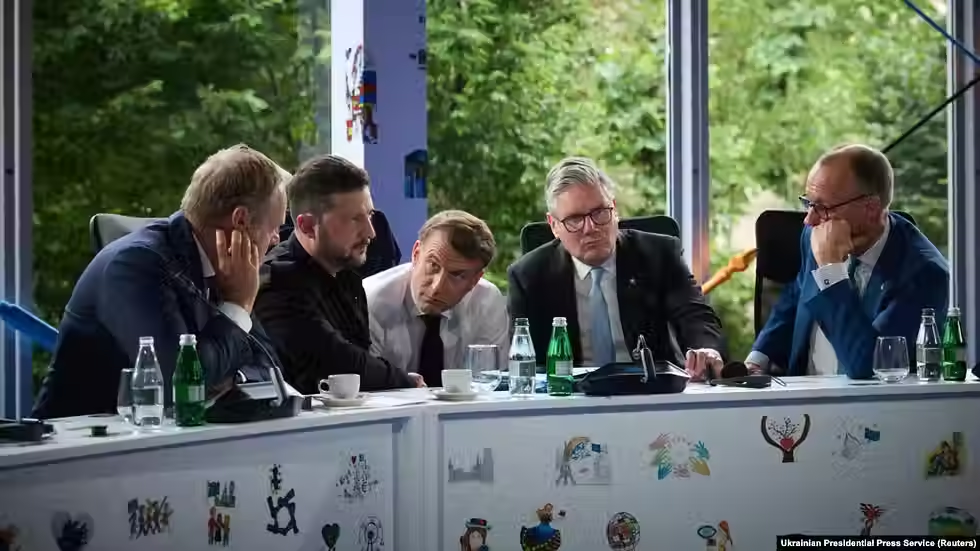High-Stakes Diplomatic Push Continues Amidst On-the-Ground Conflict in Ukraine
- Obyektiv Media
- Aug 19, 2025
- 4 min read
Updated: Aug 26, 2025

Recent diplomatic efforts, including a significant summit between US President Donald Trump and Russian President Vladimir Putin, have brought the prospect of a peace agreement in Ukraine to the forefront, though significant disagreements persist. These talks occur as Russia continues its military operations and faces new accusations of foiled attacks on the Crimean Bridge.
Russia's Peace Demands and Proposed Concessions
Russian President Vladimir Putin, during his meeting with Donald Trump in Alaska on August 15, 2025, outlined a series of demands and offers for a peace deal to end the war in Ukraine. Key aspects of Russia's proposal include:
• Recognition of Crimea: Putin demanded that Russia's sovereignty over Crimea, which it annexed in 2014, be officially recognized. It remains unclear whether this recognition is sought specifically from the United States or from all Western countries and Ukraine.
• Donbas Withdrawal: Russia proposed that Kyiv completely withdraw its troops from the Donetsk and Luhansk regions. Ukraine currently controls approximately 6,600 square kilometers of the Donbas region.
• Front Line Freeze: In exchange for Ukraine's withdrawal from Donbas, Russia pledged to freeze the front line in the Kherson and Zaporizhzhia regions.
• Sanctions Relief: Putin also sought the lifting of at least some of the sanctions imposed against Russia.
• Language and Religion: Russia demanded that the Russian language be given official status in certain areas of Ukraine or throughout the entire country. Additionally, Russia called for the Ukrainian Orthodox Church (Moscow Patriarchate) to be allowed to operate freely in Ukraine.
• Territorial Returns: It is claimed that Russia is prepared to return relatively small sections of occupied territories in the Sumy and Kharkiv regions. Russia reportedly controls about 440 square kilometers in these two regions.
Ukraine's Firm Stance
Ukrainian President Volodymyr Zelenskyy has categorically rejected such concessions, particularly regarding Crimea and Donbas. Zelenskyy emphasized that peace must be lasting and not repeat past errors, where Ukraine was pressured to cede Crimea and parts of Donbas, which Putin later used as a "staging ground for a new offensive". He stated that discussing the issue of territories is difficult as it contradicts Ukraine's constitution.
Zelenskyy arrived in Washington on August 18 for meetings with President Trump and a number of European leaders, including the NATO Secretary-General, to discuss the outcomes of the Trump-Putin summit. While seeking strong security guarantees, potentially from the US and EU without direct NATO involvement, Ukraine maintains its resolve to fight for its land and independence.
Trump's Shifting Position and US Role
President Trump's primary objective has been to end the war, fulfilling a campaign promise. Following his nearly three-hour meeting with Putin in Alaska, Trump described the talks as "productive" but admitted that "no deal until there's a deal" was achieved. He initially hoped for a ceasefire but shifted his focus to securing a comprehensive peace agreement.
Trump suggested that Zelenskyy could end the war "almost immediately" if he agreed to relinquish Crimea and abandon Ukraine's aspirations to join NATO. He also indicated that "some land changes" would be necessary for a mutually beneficial deal. US Special Envoy Steve Witkoff stated that Moscow had made "some concessions" regarding five Ukrainian regions and that significant security guarantees had been discussed between Washington and Moscow. However, US Secretary of State Marco Rubio clarified that the US is not compelling Ukraine to cede its occupied territories and acknowledged that Putin's demands are not supported by Ukraine. Rubio also suggested that new sanctions against Russia would likely reduce the chances of a peace agreement.
In a personal gesture, First Lady Melania Trump sent a letter to Vladimir Putin, delivered by President Trump, addressing the issue of abducted children in Ukraine. The International Criminal Court issued an arrest warrant for Putin in March 2023 over the illegal deportation of Ukrainian children.
Alleged Crimean Bridge Plot
Amidst these diplomatic maneuvers, Russia's Federal Security Service (FSB) claimed on August 18, 2025, to have foiled a Ukrainian "terrorist attack" targeting the Kerch Bridge, which connects Russia with occupied Crimea. The FSB alleged that a car containing a powerful homemade explosive device entered Russia from Ukraine, transiting through several countries, and crossed into Russia from Georgia via the Lars checkpoint. This was reportedly the second attempt by Ukrainian services to use a vehicle with explosives on the Crimean Bridge in 2025.
In 2022, the FSB had made similar claims regarding explosives for a previous Crimean Bridge explosion, which Georgian authorities denied, stating no evidence supported the allegations. In 2024, a Russian court sentenced a Georgian citizen in absentia for "terrorist attack" charges related to the 2022 explosion. A Georgian Dream party deputy, Mamuka Mdinaradze, reacted to the latest claims by stating he doesn't rule anything out, acknowledging that Russian special services pursue their own interests.
Ongoing Conflict and Military Situation
While diplomatic talks unfold, Russia continues its military actions against Ukraine. On August 18, Russia launched deadly air strikes on Ukraine, including a multi-story residential building in Kharkiv, which killed seven people, including two children, and injured at least 20. Drone strikes also targeted Zaporizhzhia and Odesa regions, resulting in three reported deaths in Zaporizhzhia.
According to Ukrainian Commander-in-Chief Oleksandr Syrskyi, the front line situation remains "very difficult" as Russia prepares for major offensives in the Pokrovsk and Zaporizhzhia directions. Russia currently occupies over 20% of Ukrainian territory, including the entirety of Luhansk and significant parts of Donetsk, Zaporizhzhia, and Kherson regions.
Poland's President Karol Nawrocki, a proponent of Trump's initiatives, affirmed that the Russian army can be defeated, citing historical examples and Ukraine's ongoing resistance, emphasizing that "Russia is not invincible".



Comments